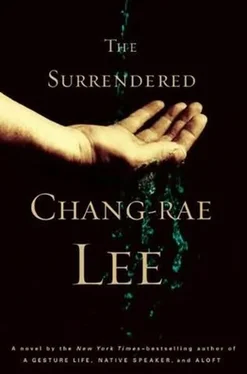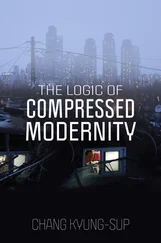The stew was much heavier and richer than what they were accustomed to and a handful of the kids would eat too much too quickly and vomit, but then come back for another bowl anyway. June would stay on the periphery and wait until the clamor died down, and he remembered now how she’d insist he fill her bowl to its brim, keep pushing her hands up to him and say in her disarmingly good English, I am very hungry today . I want more. She was the best English-speaker among the kids, but employed it sparingly, and for her own ends, rarely willing to be a translator or advocate for anyone else. Unlike most of the other children, she was short-tempered and difficult and in certain lights insufferable but you never knew what horrors any of them had survived or witnessed or had to commit, and there was no use in judging. He’d comply and give her what she wanted, and she’d go off on her own and despite what she’d said eat her food with cold method, careful spoon by spoon, as though she were counting them for the next time.
“Maybe I’ll try some,” she said. “It almost smells good. To me. You know what I mean.”
“It’ll be ready soon.”
“May I have some of that water?”
There were no cups in the cottage, so he just gave her the glass bottle, but it was a full liter and a half and a bit too heavy for her and he had to help hold it up; she had some trouble drinking straight from the bottle and some went down her airway and she had a brief coughing fit before she could lie back down. When he was finished cooking he asked if she still wanted some and she nodded. He bore the hot pot over and placed it on a stool between them, pulling up the other for himself. There were no plates or bowls and only the one wooden spoon, and he offered it to her.
“You eat,” she said. She was sitting up now, her narrow shoulders pinched forward, making her seem slighter still, folded in, like she was an image in the crease of a book. “I just want a taste anyway.”
“You ought to go first, then.”
He handed her a scant spoonful of it, its consistency more like a soup than a stew. She took it, chewing tentatively, and then had another, two large full spoons. She rapped the spoon on the edge of the pot and offered it to him.
“You keep going,” he said.
“We can share.”
“You better eat while you want to,” he said. Then he added, “While you can.”
She nodded, and had two more spoonfuls, though the final one seemed to stick in her throat. He had opened a bottle of the homemade wine, leaving the equivalent of fifty dollars in lire for it and the rest of the things he had opened, from the money she had had him change in Livorno. In fact she’d given him her bankroll to hold, twelve thousand dollars or so in traveler’s checks and cash, vastly more money than he’d ever seen at once. But he’d never cared about money and he would have likely traded a good deal of it for a corkscrew, if the cottage hadn’t had one. (Though he’d smashed open the tops of bottles before.) He found one, though, and his hands were calmed by the familiar heft of the bottle, and in one smooth continuous action he pulled the cork and brought it to his lips. The wine wasn’t wine at all but a very strong, clear brandy, harsh and chemical, like dry-cleaning fluid might taste, but it was right enough; he drank nearly a third of it in one slug. He sensed her watching him with hooded eyes, undoubtedly wondering whether he was that much better off than she.
“You didn’t drink so much back then,” she said.
“You wouldn’t have seen me.”
“I did,” she said. “I sometimes followed you. You didn’t know, but I spied on you.”
He took another long slug and tried not to think of what she might have witnessed, though not because it wouldn’t have been right for a young girl; he was simply shielding himself, for as much as the memory of Sylvie Tanner charged hotly through him, the picture of her milkhued throat only made him more wary, and then thirstier. He hadn’t drunk in more than a day, and if anything the craving in his body was the opposite of June’s: he wasn’t moving quite fast enough, he couldn’t feel any of that phantom speed, the easy gearing that the drink let him slip into, allowing him to gain a merciful distance from himself, which was the pathetic excuse of a creature he had come to be: loser-for-eternity, world-class self-pitier, tireless batterer of men and embodied doom of women, this now wholly bereft last man standing.
June said, “I remember, just before the end, when Reverend Tanner was letting her have it. Telling her what a disgrace she had become.”
“Where was I?”
“You were gone for the day,” she said. “Maybe you had gone to the base, for supplies. It was morning and she was sitting in the patch of grass behind their cottage. She had missed breakfast again, and I had come to sweep and clean. Her eyes were bloodshot and her hair was messy and he was standing over her, so tall and high. He didn’t shout. But for some reason I was sure he was going to strike her. I had his glass paperweight in my hand and I was ready to hit him, if I had to. Of course he didn’t.”
“He wasn’t like that,” Hector said.
“No, he wasn’t,” June answered. “But he kept telling her how ashamed he was. How she was an embarrassment to herself, and to him. She just sat there, taking it. I was so angry.”
How easily Hector could see June, more than thirty years removed, wielding some sharp crystal. And then Sylvie, in a cloak of miserable penitence that she was all too ready to don. Tanner had returned from another overnight trip to nothing different except that she was obviously sluggish, exhausted, moving about as if she were the one who had been on the road for a week. She was sleeping late some days, something that she would never have done before. Tanner had asked Hector twice if anything odd had happened, whether she had seemed ill, but he simply shook his head, not wishing to have to lie outright. After that first week of their arrival, the man had been nothing but fair to him. He wouldn’t apologize, but he didn’t need to have Tanner know, either, that she had spent the previous four nights in Hector’s bed, neither of them sleeping at all, he drinking and she drugging herself in alternation with their lovemaking, which for Hector was a revelation, this woman whose sexual hunger was both a plea and a hazard, like someone floundering in waves far from shore.
“When you were spying on us. Were you in the storeroom?”
“Yes.”
His room was on the end of a long, low wood-framed building that was roofed with sheets of corrugated tin. It was a room much like this one, though half its size, with a single cot and a rusted metal shelf for his things but no window onto the dirt courtyard. It was never meant for habitation. Next to it was a general storeroom for the orphanage-study books and pencils, some canned foodstuffs, tools and rakes, Bibles, donated blankets and children’s clothes and shoes, square cans of kerosene. June described how she had crouched low against the shared wall, a wall that he himself had erected with materials on hand, salvaged studs and panels of pegboard that he covered with canvas. “There was a gap in the fabric on your side, down near the floor, and if I pressed my eye up I could see through the holes.”
“We never knew.”
“I was careful to be quiet.”
“How many times were you there?”
“I don’t know.”
He took a long drink, and then another. “Why are you telling me this?”
“I don’t know, exactly,” she said. But her eyes were enlivened, gleaming brightly against her sallow face, the last pools in a forsaken plain. “After she told me I couldn’t work in the house anymore, I wanted to hate her. But then she started seeing you and I could see a way, again.”
Читать дальше











